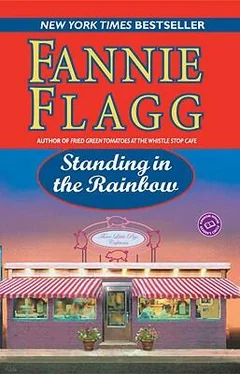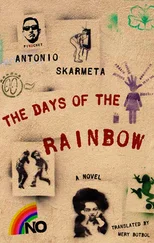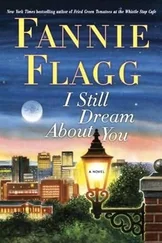Fannie Flagg - Standing in the Rainbow
Здесь есть возможность читать онлайн «Fannie Flagg - Standing in the Rainbow» весь текст электронной книги совершенно бесплатно (целиком полную версию без сокращений). В некоторых случаях можно слушать аудио, скачать через торрент в формате fb2 и присутствует краткое содержание. ISBN: , Жанр: Современная проза, на английском языке. Описание произведения, (предисловие) а так же отзывы посетителей доступны на портале библиотеки ЛибКат.
- Название:Standing in the Rainbow
- Автор:
- Жанр:
- Год:неизвестен
- ISBN:0-679-42615-9
- Рейтинг книги:3 / 5. Голосов: 1
-
Избранное:Добавить в избранное
- Отзывы:
-
Ваша оценка:
- 60
- 1
- 2
- 3
- 4
- 5
Standing in the Rainbow: краткое содержание, описание и аннотация
Предлагаем к чтению аннотацию, описание, краткое содержание или предисловие (зависит от того, что написал сам автор книги «Standing in the Rainbow»). Если вы не нашли необходимую информацию о книге — напишите в комментариях, мы постараемся отыскать её.
Standing in the Rainbow — читать онлайн бесплатно полную книгу (весь текст) целиком
Ниже представлен текст книги, разбитый по страницам. Система сохранения места последней прочитанной страницы, позволяет с удобством читать онлайн бесплатно книгу «Standing in the Rainbow», без необходимости каждый раз заново искать на чём Вы остановились. Поставьте закладку, и сможете в любой момент перейти на страницу, на которой закончили чтение.
Интервал:
Закладка:
Sometime later Bobby hit the front door of his house running and didn't stop until he got to his room and onto his own bed. When Anna Lee, who was out on the porch, saw the look on his face as he went by, she figured someone was chasing him. She got up to look and see if it was Luther Griggs, the big bully who was always beating Bobby up any chance he got, but Luther was nowhere in sight.
Poor Monroe had stayed up on the tower for at least another forty-five minutes, trying as hard as he could to attach one of those red balloons to the side of the railing, but they all flew off.
But for Bobby the day had been far more than just the failure of the balloon caper. It was the first time he had seen his life from a distance or from anywhere, for that matter, except from the center of his own giant universe. Could it really be possible that he was nothing but just another small dot among a bunch of other small dots?
He had always thought he was something different, something special.
Now he was thrown for a complete loop.
Raggedy Ann
That night Bobby was especially sweet and after dinner, when they were all out on the porch, he went over to his mother in the swing, lay down with his head in his mother's lap, and went to sleep, something he had not done since he was six. It was an extraordinarily warm evening and the entire family, including Jimmy and Dorothy's red-and-white cocker spaniel, Princess Mary Margaret, all sat out trying to catch a little night breeze. It was a quiet night and they were enjoying the sound of the crickets and the soft squeak of the swing. Dorothy looked down at Bobby. He was now in such a deep sleep that when she crossed her legs with his head in her lap he did not awaken. She smoothed his hair back off his forehead. "He must have been up to something today because he's dead to the world tonight."
Anna Lee said, "I thought Luther Griggs was after him again. He ran in the door this afternoon going about a hundred miles an hour."
His mother sighed. "I'm worried that the Griggs boy is really going to hurt him one of these days. He's already a head taller than Bobby."
Doc knocked the ashes out of his pipe against the side of the porch.
"Oh, I wouldn't worry too much. He'll have to catch him first. Bobby may be little but he's fast."
Dorothy thought about it and was somewhat reassured. "Well, that's true. The other day, by the time I got my switch he was out the door and so far out in the field all I could see was the top of his head."
Anna Lee, who, now a teenager, had recently started referring to her brother as "that child," made an observation. "That child is certainly a lot of trouble, isn't he, Mother?"
"Yes, but he can be sweet when he wants to. He's just at that age, I suppose."
"Was I ever like that?" asked Anna Lee.
"No. You were just a little angel, wasn't she, Mother?"
Mother Smith agreed. "Absolutely. You were the best-behaved little girl. I used to take you everywhere with me and all I had to do was to put you down with one of your little dolls and you'd sit there and play and I never heard a peep out of you."
"You loved your dolls," Dorothy said. "That big Raggedy Ann was your favorite; you used to take it everywhere."
They sat there in the quiet listening to the crickets for a few more minutes. Then Dorothy turned to Anna Lee. "What ever happened to your Raggedy Ann doll?"
"Bobby knocked its head off."
"Oh."
Just then Tot Whooten, a frazzled-looking woman, walked by on the sidewalk headed somewhere in a hurry. She did not stop but waved her hand in the air and called out over her shoulder, "Momma's left her purse at the picture show again and I've got to get there before they close."
Mother Smith shook her head. "Poor Tot, that's the second time this week."
Dorothy agreed. "Poor Tot."
A few minutes later, Tot came walking by again, this time with her mother's huge black purse on her arm. Mother Smith called, "I see you got it."
"Yes, thank heavens Snooky found it and was waiting for me. Good night."
They all said, "Good night." Mother Smith added, "Tell your mother I said hello."
"O.K."
And after she was out of earshot Dorothy said "Poor Tot" again. Several other people walked by on their way home from the movie and waved. After a moment, Dorothy said, "I wish Bobby hadn't done that to Raggedy Ann. I was hoping you could give it to your little girl someday.
You just loved that doll. You even took it to first grade with you."
She looked at her daughter with a sad, wistful expression in her eyes.
"It seems like only yesterday when I was taking you to your first day of school."
"Didn't I just walk?" Anna Lee said. "It's only two blocks."
"No. I took you the first day but you weren't afraid. You seemed happy to go really, you and Raggedy Ann. I stood there and watched you go up the steps and when you got to the top you turned and gave me a little wave and went on in. And oh, it nearly broke my heart, I was losing my little girl. I stood there on the street just crying my eyes out for all the world to see."
Anna Lee said, "You did?"
Doc nodded. "Oh yes," he said and relit his pipe, shook the match out, and put it in the ashtray by his chair. "Your mother came down to the drugstore practically hysterical. You would have thought she had just put you on a freighter headed for China."
This was the first time Anna Lee had heard this story. "Were you that upset when Bobby went off to the first grade?"
Dorothy looked down at her sleeping son for a moment.
"No. I hate to say it but I think I was actually relieved. The day before he had ruined all six cakes I had baked for the church sale, ran his finger around the bottom of each one and ate the icing. So, no, I was glad to let somebody else have him for a while. But little boys are different. When you get married and have one of your own, you'll see for yourself."
Anna Lee shook her head. "Not me. I'm not having any boys. I'm only going to have girls."
Mother Smith laughed. "That's not something you can control, honey. You may want little girls but wishing doesn't make it so."
"Then I'm not ever getting married."
Mother Smith smiled. "That's what we all say until Mr. Right comes waltzing in the door. Isn't that right, Dorothy? "
"It was for me. I told everyone I was going to New York to go on the stage and become the next Sarah Bernhardt. Then your father asked me to the Christmas dance and there went my Broadway career plans out the window." Dorothy moved a little in the swing, and Bobby's head moved with her. "Now my other leg has gone to sleep. I don't know what he has in his head but it weighs a ton."
"Rocks probably," said Anna Lee.
Jimmy stood up, yawned, and stretched. "Well, folks, I guess it's about that time. See y'all tomorrow."
"Good night, Jimmy."
Dorothy looked at Doc. "You better come over here, Mr. Right, and take your son to bed. I need to get on in and work on the show before it gets too late. It's almost ten o'clock."
Doc put his pipe down and walked over and picked Bobby up and put him over his shoulder. "Should I put his pajamas on?"
"No, just let him sleep in his clothes. It won't hurt him."
Doc said, "Good night, all." As he got to the screen door he turned to Dorothy and said, "Good night, Miss Bernhardt."
Doc Smith
Doc was much older than the other fathers of Bobby's friends and it worried him because he could not roughhouse or play football with his son like they could, but as far as Bobby was concerned there were plenty of things he did with his father that more than made up for it.
Doc, it seems, had been a good baseball player in his youth and was still an avid baseball fan and so was Bobby. They listened to all the games on the radio together and studied the players' statistics. With Doc's vast knowledge of baseball he taught Bobby to appreciate the finer and more subtle elements of the game. And though Doc was never much of a hunter, he did love to fish and from the time Bobby could walk he always took him along. Doc would come into his room at about 3:30 in the morning, long before it was light, and wake him. Bobby would get up and dress and they would both quietly slip out the front door so the Robinsons' chickens would not wake up the neighborhood. Doc would start the 1938 Dodge with the bad muffler as quietly as possible and drive in the dark through the back roads until they came to the river. It was on these mornings that his father would let him have a sip of coffee from the thermos he had brought, preceded with "All right, just a sip, but don't tell your mother." This little ritual made Bobby feel as if he and his father were partners in a grand conspiracy. Even though the coffee always tasted bitter and horrible, he endured it without making a face. It was a man thing. Sometimes they would go with Glenn Warren and his son, Macky, but he liked it best when it was just him and his father. He loved having his father introduce him to the other men at the camp as his son. He could tell they all respected his father and it made him feel proud. He also enjoyed going to Old Man Johnson's fishing camp, where they rented their boat. The ramshackle wooden cabin was filled with rods and tackle. Mounted fish of all kinds and sizes hung on every inch of the wall. Also alongside the fish hung a 1945 calendar with a picture of a pretty girl in short shorts fly-fishing in a stream that Bobby thought was exotic. They always bought their live bait out of the cooler plus two cold drinks, crackers and tins of sardines and Vienna sausages for their lunch, and were usually out on the water just as the sun was coming up. Bobby's job was to row the boat back up into the deep shady places, where the big fat trout and catfish liked to hide, while his father cast his line as close to the bank as possible.
Читать дальшеИнтервал:
Закладка:
Похожие книги на «Standing in the Rainbow»
Представляем Вашему вниманию похожие книги на «Standing in the Rainbow» списком для выбора. Мы отобрали схожую по названию и смыслу литературу в надежде предоставить читателям больше вариантов отыскать новые, интересные, ещё непрочитанные произведения.
Обсуждение, отзывы о книге «Standing in the Rainbow» и просто собственные мнения читателей. Оставьте ваши комментарии, напишите, что Вы думаете о произведении, его смысле или главных героях. Укажите что конкретно понравилось, а что нет, и почему Вы так считаете.












